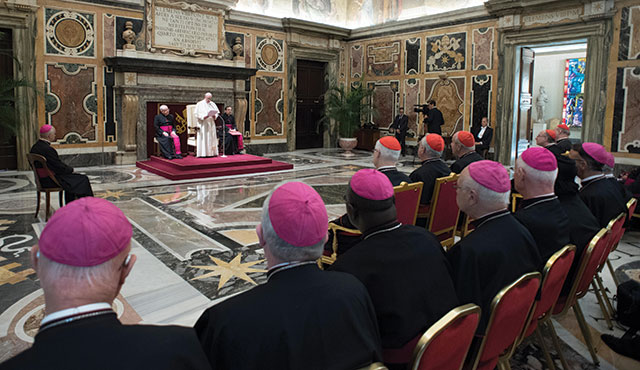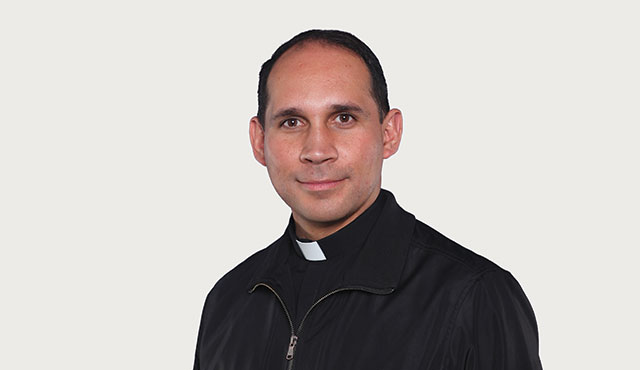In his 2013 apostolic exhortation Evangelii gaudium (“The Joy of the Gospel”), Pope Francis stressed “the Church’s primary mission of evangelization in the modern world.” He urged the Church “to embark on a new chapter of evangelism.” While discussions of changes to evangelism go back to Vatican II, the Pope saw an obligation to remind the Church about its importance.
Some may question the need for changes in the way Jesus’ message is shared with the world. Many others, however, are saying, ‘Better late than never.’”
A Gallup Poll released last April revealed the percentages of Catholics who have attended church over a seven-day period. In 1955, 75 percent did so. By 2017, the number had plummeted to 39 percent. Gallup’s findings mirror scores of similar polls.
“What we see in the 20th and 21st century is a decline of Christian identity in the Christian world,” says Katie Dawson, the Diocese’s director of Parish Faith Formation.
Pope John Paul II first mentioned the term “new evangelization,” during his historic 1979 visit to Poland. “A new evangelization has begun, as if it were a new proclamation, even if in reality it is the same as ever.”
His apparent contradiction points to a key element: Any new way of sharing Jesus’ message in no way changes the holy and time-honored message itself.
“It’s the same teachings, only in a new way of presenting them,” says Fr. Juan Navarro, consultant for the Bishop’s Office of Evangelization and for the Office for Faith Formation. “We need to renew our ways of teaching.”
Dawson notes that new evangelization focuses on deepening the faith of those who already believe in the Christian way. “Evangelization used to stress the task of missionaries going around the world. New evangelization looks at how we’ve had, for some time, a nominal Christian identity.”
Fr. Juan emphasizes how a timeless approach to evangelizing serves as a way of carrying the core, eternal messages of Jesus. “A good number of our parishes are still using the liturgical calendar as a model of evangelization. “These activities work around liturgy and sacraments only, and they do not pay attention to other, more essential, dimensions of the Christian life.”
“When we enter into a transformative relationship with God, and we come to worship Him, time stops,” Dawson says. “Everyone is preoccupied with all the mechanics of liturgy, but we’re missing the point. It’s been said that what we’ve done is ‘sacramentalize’ people, not evangelize them.
“However,” she stresses, “we’ve always done a lot of very, very good things. And we don’t want to change that.”
Parishioners who share their faith, Fr. Juan says, should do so with the support of other believers. “Today it is essential to build a real sense of community and a shared understanding of the call to become disciples, as well as the urgency of developing in our communities a process of initiation into Christian life.
“For the people to honestly know Christ in depth and follow him faithfully, they must be led, especially in reading and meditating on the Word of God,” Fr. Juan adds. “It’s the primary foundation of ongoing catechesis.” He refers to Lectio Divina (“Divine Reading”) and its five key points in the evangelization process: Encounter with Christ, Conversion, Discipleship, Communion and Mission.
Fr. Juan, who recently returned from Spain after spending two years studying at the Pontifical University
of Salamanca, earned a master’s degree in pastoral theology. He titled his master’s thesis, “The Dialogue Between God and Man. The Scripture in the Life and the Mission of the Diocese
of Orange.” An advisor to Dawson, he is helping to bring changes to evangelization for local Catholics. “It’s really about renewal and how to help our Diocese become a Diocese that will bring Jesus – His love and His mission – to everyone. It’s about how we’re all invited [clergy and parishioners alike] to be apostles and to express our joy to others.”
“When we think about the mission of the Church, we tend to consider problems to be addressed by the clergy,” Dawson says. “But today our primary emphasis is to activate all the baptized for this mission. By virtue of our baptism, we’re all responsible for the mission of the Church. It can no longer be delegated to the professional class or the clergy.”
Evangelization and faith formation are top priorities of Bishop Kevin Vann’s overall strategic plan, which will shepherd the Diocese toward a bright future. Although Dawson notes that they haven’t formulated an exact, step-by-step plan to bring new evangelization to the Diocese, one will be developed after the overall plan’s advisory process is complete. “We have already been advising early adopters of new evangelization on steps to become more effective in evangelization. And we have been talking about new methods regarding faith formation and youth ministry directors for several years.”
Dawson reiterates one of the core messages of new evangelization: “If we’ve met Jesus and He’s made a difference in our lives, we want to share our experience with others. It’s not a ‘should’ – it’s a mission.”


